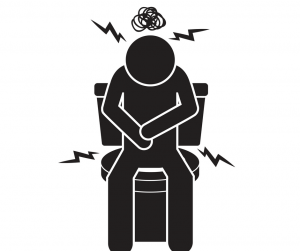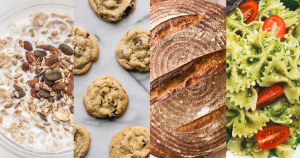One of the most talked about nutrition topics of the past couple of years has been whether or not gluten should have a place - or be forbidden - in our diets. Until recently, even the word ‘gluten’ would have been used almost exclusively in culinary, confectionary, and severe allergy professions alone. But, due to the recent increase in understanding about gluten, its properties, and health effects, the idea of going gluten-free has gained major popularity and as an understandable result, has left many people wondering whether or not gluten-free is the way to go in their own lives. If you’ve been curious about gluten, even if you’ve already experimented with gluten-free living, it’s important to have a good understanding of the basics around the topic, so you can make informed decisions about the nutrition you and your family access.
What is gluten anyway?
Gluten is the name of a family of proteins found in wheat and wheat related grains. Gluten itself is what enables foods made of ingredients to hold their shape. They act almost like ‘glue’ to give foods texture, and hold it together. It can be found in many foods, even where you might not expect it.
There are three big categories of grains that are known as ‘glutinous grains.’ These include:
- Wheat (including wheat berries, durum, emmer, semolina, spelt, farina, farro, graham, kamut, and einkorn)
- Barley
- Rye
Things like breads and crackers, pastries, pastas, cereals, beer, soups and sauces (which could contain grains or flours as thickeners), brewer’s yeast, and food colouring are some foods and beverages that contain these grains and therefore naturally contain gluten but; sometimes, gluten itself is also used in other foods to act as a binding agent to give texture and hold to other products.
Are most people allergic to gluten?

You may have heard that most people cannot tolerate gluten, or that grains today are different than the grains our ancestors used to eat. However, many studies have shown that in fact, grains and gluten are well-tolerated by the majority of people. That being said, there are three key groups of people who greatly benefit fromremoving gluten from their diets.
Celiac disease, suffered by 1% of people, is a condition of the immune system in which eating gluten triggers an intestine-damaging response. Symptoms of celiac disease are serious and uncomfortable and include abdominal pain, skin rashes, headaches, diarrhea, vomiting, and even unexplained weight loss. In cases of celiac disease, it’s imperative for the individual to remove all sources of gluten from their diets as well as from any personal care items they use, since some of the unlikely sources of gluten can include lipsticks and balms, body and handy creams, and cosmetics which could introduce trace amounts of gluten that would trigger a reaction.
Non-Celiac Gluten Sensitivity
While celiac disease is rare, the percent of people who suffer from non-celiac gluten sensitivity is unknown and triggers similar symptoms. Unfortunately, because validated biomarkers or tests are have not yet been developed, accurate diagnosis of this condition is still challenging. That said, it’s still important for this group of people to remove gluten from their diets to ensure they are not taxing their immune systems unnecessarily.
Those with Other Gut Disorders
There’s still a third group of people who also benefit from removing gluten - those who suffer from other gut-related illnesses such as IBS (irritable bowel syndrome), Crohn's disease, and ulcerative colitis and who require a FODMAP diet. FODMAPs are a group of small carbohydrate molecules found in all kinds of foods. While they are extremely common, they may be poorly absorbed in the small intestine of some people with already compromised digestive functions. Taking out glutinous foods is a key way of relieving part of the strains on a weakened digestive system because it naturally removes the FODMAPs that cause them to begin with.
What do I need to know to go gluten-free?

Whole grains do contain a number of important nutrients, suchas fiber, iron, calcium, magnesium, zinc, folate, niacin, riboflavin, vitamin B12, and vitamin D, and some protein. So when deciding to remove whole gluten-containing whole grains from your diet, be sure create a robust diet that can replace these, and/or take supplements to add to your security.
Know too, that while many gluten-free substitutes like cookies, brownies, and breads usually contain higher levels of fats, sugar, and salt than their conventional counterparts. If you crave the comfort of baked goods or cereals, we recommend creating your own gluten-free versions at home for the healthiest alternative.Going gluten-free will take time, patience, and practice - we know, because we’ve helped dozens of families doit with success! Sometimes you don’t even realize how much gluten is affecting your system until you eliminate it. Check our Facebook page where we feature monthly gluten free recipes and you’ll find a few tried and true favourites to get you going.

If you suffer from symptoms such as constant stomach pain, headaches, bowel issues or other symptoms that could be related to gluten sensitivity, please book an appointment so we can do a full naturopathic intake and properly test you for celiac disease. We want to make sure you’re living your healthiest life possible! If not, but you’d still like to explore the health benefits of removing gluten, we’d love to help you make a plan to get your health back on track by managing your gut health.
To book your appointment with one of our naturopathic doctors or nutritionist please call us at 416-234-1888 or email us at wellnessreception@sympatico.ca.
To your good health,
Wellness Institute


